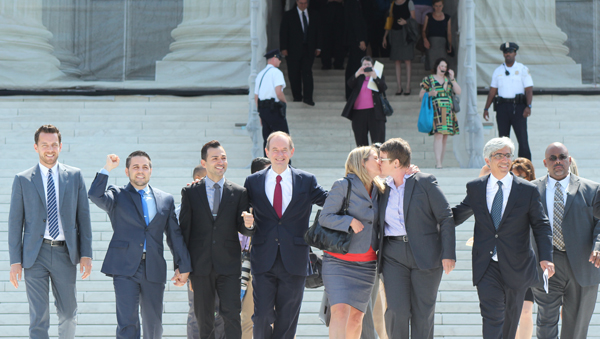WASHINGTON (RNS) The Supreme Court decisions on gay marriage, while historic, didn’t settle the issue. In fact, they fuel it.

Wes Warner (right) holds a gay pride flag during a rally celebrating the Supreme Court’s gay marriage ruling at Ilus W. Davis Park in Kansas City, Mo., on Wednesday (June 26). RNS photo by Sally Morrow
For President Obama, the repercussions of Wednesday’s (June 26) ruling striking down part of the Defense of Marriage Act will mean review and revisions in hundreds of federal laws. In everything from Social Security checks to Pentagon benefits, gay married couples now must be treated the same way as heterosexual couples.
For gay rights advocates, the twin decision that opens the door to resume same-sex marriages in California bolstered determination to expand the right to wed for gay men and lesbians. The Human Rights Campaign set a goal to achieve that in all 50 states within the next five years.
And for opponents of gay marriage, the battle turned to state capitals, where 36 states bar gay marriage by statute or constitutional amendment.
“We didn’t lose,” Brian Brown of the National Organization for Marriage said, noting the high court had declined to recognize a constitutional right to marry. “They punted.”
The two decisions were undeniably far-reaching, clearing the way for gay marriages to resume in the nation’s largest state and striking down a federal law that barred the government from recognizing same-sex marriages sanctioned by states. But previous landmark court decisions on divisive issues, including racial integration and abortion rights, have prompted decades of legal and political fights over their meaning and implementation, not to mention efforts to reverse them.
“The good side of this ruling is that they have affirmed to states that this is a state issue and states can decide,” Sen. Rand Paul, R-Ky., said on Glenn Beck’s radio show. He counseled allies: “The battle is going to be lost at the federal level. Concentrate on your state.”
“With these two historic rulings, we’ve taken two giant steps forward toward the American promise of equal justice under law,” Chad Griffin, president of the HRC, said in an interview. “We celebrate today, and tomorrow we wake up and fight like hell.”
Attorney General Eric Holder promised that the administration would work “expeditiously” to implement the changes in laws and benefits stemming from the demise of DOMA. “Important, life-changing work remains before us,” he said.
In the second case, the challenge to California’s Proposition 8 banning gay marriage, the court’s narrow ruling — that the supporters of the ban didn’t have the standing to bring the case — doesn’t affect other states.
That leaves an expanse of battlegrounds and a patchwork of laws. While every state in New England now recognizes same-sex marriages, for instance, not a single state in the South does. That reflects regional politics: 64 percent of those in the Northeast support gay marriage, a survey by the Pew Research Center last month found, compared with 43 percent in the South.
Overall, by 51-46 percent, Americans said they favor allowing gay men and lesbians to wed, the first time a majority has espoused that view in the Pew Research Center poll.
The relatively subdued reaction Wednesday by House Speaker John Boehner and Majority Leader Eric Cantor was a reminder of the balancing act GOP leaders are playing on divisive social issues such as immigration and gay marriage.
They need to satisfy base supporters who strongly oppose same-sex marriage but be mindful that language that seems intolerant harms the national GOP brand and the prospects for regaining the White House. That is a tightrope that the GOP’s 2016 presidential contender also may have to walk.

Plaintiffs Sandy Stier and Kristin Perry kiss on Wednesday (June 26) as they leave the Supreme Court with others who argued against California’s Proposition 8, which banned gay marriage. Two other plaintiffs, Jeff Zarrillo, second left, and Paul Katami, third left, exited with them. Between the couples is attorney David Boies. The high court rejected Prop 8 on legal grounds. RNS photo by Adelle M. Banks
“A robust national debate over marriage will continue in the public square, and it is my hope that states will define marriage as the union between one man and one woman,” Boehner said in a written statement. The House had paid to defend DOMA in court when the Obama administration refused to do so.
One of the most outspoken conservative comments came from Minnesota Rep. Michele Bachmann, a favorite of the Tea Party movement. “Marriage was created by the hand of God,” she declared. “No man, not even a Supreme Court, can undo what a holy God has instituted.”
Asked about Bachmann’s comments, House Minority Leader Nancy Pelosi retorted: “Who cares?”
Sen. Dianne Feinstein of California and Rep. Jerrold Nadler of New York, senior Democrats on the House and Senate Judiciary committees, reintroduced a measure to repeal the parts of the Defense of Marriage Act that survived the court’s scrutiny.
Meanwhile, Rep. Tim Huelskamp, a Kansas Republican, said he would push Congress to adopt a constitutional amendment defining marriage as between a man and a woman.
“This doesn’t end it,” Huelskamp said.
(Susan Page, Catalina Camia and Susan Davis write for USA Today.)




